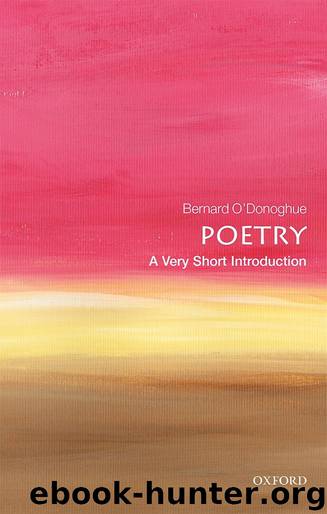Poetry by Bernard O'Donoghue

Author:Bernard O'Donoghue
Language: eng
Format: epub
ISBN: 9780192545282
Publisher: Oxford University Press
Published: 2019-08-13T00:00:00+00:00
where again the two Latinate polysyllabic terms are made more effective by contrast with the Anglo-Saxon monosyllables in the lines preceding and following.
If these instances tempt us to revisit the Wordsworth–Coleridge distinction between the language of poetry (and other literary registers) and normal speech, we should remember that from its medieval origins English has exploited constructively the possibility of stylistic felicity in playing off such components of word-formation against each other. In general, from the 16th century to Matthew Arnold at the end of the 19th, there has been a preference for ‘plain Anglo-Saxon’ over what Arnold called the ‘lubricity’, the slipperiness, of French: a prejudice which was openly declared even by writers who demonstrably did not act on it in their own practice. The preference for the plain Anglo-Saxon extended to a claim for truth (which recalls Plato’s strictures on poetry), famously celebrated in Foxe’s Book of Martyrs. The words given by Foxe to Hugh Latimer, burnt at Oxford in 1555, to address his fellow martyr Nicholas Ridley, are a classic and much-quoted instance: ‘Play the man, Master Ridley; we shall this day light such a candle, by God’s grace, in England, as I trust shall never be put out.’
This unadorned prose language has found favour with commentators on English poetry too, sometimes by contrast even with Milton whose ringing magnificence in Paradise Lost has often been accused of foreignness in English. Samuel Johnson says of Milton in The Lives of the Poets that ‘both in prose and verse, he had formed his style by a perverse and pedantic principle’, but ‘such is the power of his poetry that his call is obeyed without resistance, the reader feels himself in captivity to a higher and nobler mind, and criticism sinks in admiration’. Johnson continues with this ambivalence towards Milton’s ‘grace in its deformity’, quoting Samuel Butler’s calling his language ‘a Babylonish dialect’, but concludes that Milton ‘has selected the melodious words with such diligence that from his book alone [Paradise Lost] the Art of English Poetry might be learned’ (as Lewis said it might be from Chaucer).
In the discussion of English poetry it is almost inevitable to encounter Milton in connexion with enhanced or specialist diction. Early in the 20th century, T. S. Eliot and F. R. Leavis raised something of a sacrilegious critical storm by criticizing Milton’s language for what Eliot called ‘the hypertrophy of the auditory imagination’; that is, for using a language that was more sonorous than pictorial—the language that Tennyson had admired when he called Milton the ‘mighty-mouthed inventor of harmonies’.
Clearly, one of the great strengths of English as a language for poetry—or for any artistic expression—is its double lexical structure. It equipped Milton to write ‘in hideous ruin and combustion down | to bottomless perdition’ in Paradise Lost, as well as the great plainstyle last line of the sonnet ‘On His Blindness’—‘They also serve who only stand and wait.’ In exploiting this lexical double structure, Milton was—as we have seen—preceded by Chaucer whose style at the outset of post-Conquest English poetry is already a miracle of various expressiveness.
Download
This site does not store any files on its server. We only index and link to content provided by other sites. Please contact the content providers to delete copyright contents if any and email us, we'll remove relevant links or contents immediately.
| Ancient & Classical | Arthurian Romance |
| Beat Generation | Feminist |
| Gothic & Romantic | LGBT |
| Medieval | Modern |
| Modernism | Postmodernism |
| Renaissance | Shakespeare |
| Surrealism | Victorian |
4 3 2 1: A Novel by Paul Auster(12358)
The handmaid's tale by Margaret Atwood(7735)
Giovanni's Room by James Baldwin(7307)
Asking the Right Questions: A Guide to Critical Thinking by M. Neil Browne & Stuart M. Keeley(5745)
Big Magic: Creative Living Beyond Fear by Elizabeth Gilbert(5731)
Ego Is the Enemy by Ryan Holiday(5398)
The Body: A Guide for Occupants by Bill Bryson(5067)
On Writing A Memoir of the Craft by Stephen King(4921)
Ken Follett - World without end by Ken Follett(4711)
Adulting by Kelly Williams Brown(4556)
Bluets by Maggie Nelson(4538)
Eat That Frog! by Brian Tracy(4505)
Guilty Pleasures by Laurell K Hamilton(4430)
The Poetry of Pablo Neruda by Pablo Neruda(4083)
Alive: The Story of the Andes Survivors by Piers Paul Read(4013)
White Noise - A Novel by Don DeLillo(3995)
Fingerprints of the Gods by Graham Hancock(3980)
The Book of Joy by Dalai Lama(3963)
The Bookshop by Penelope Fitzgerald(3829)
